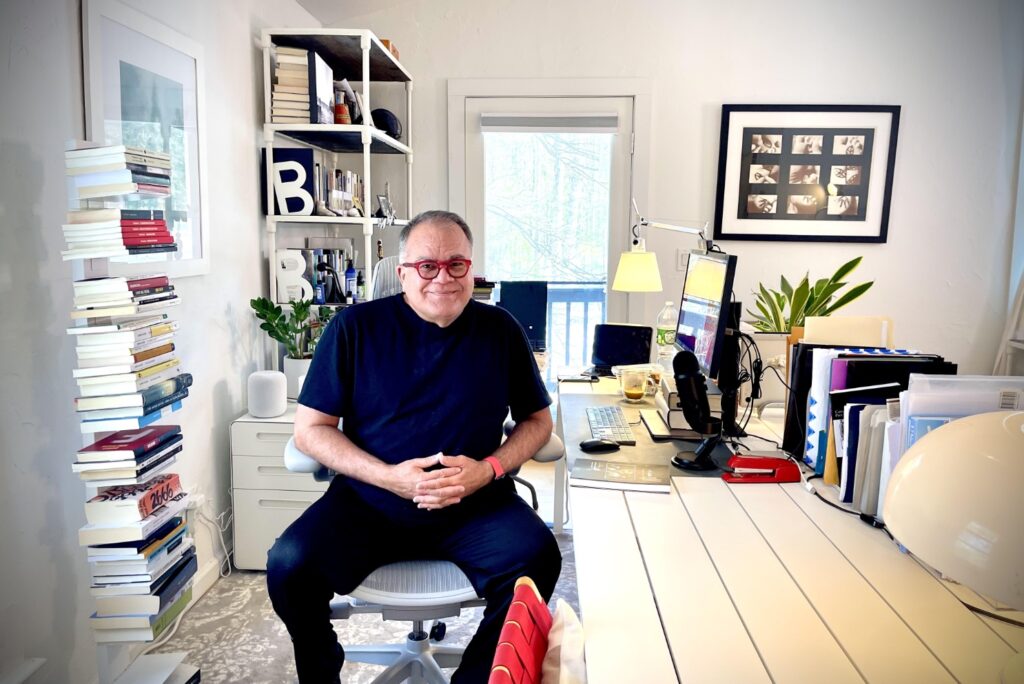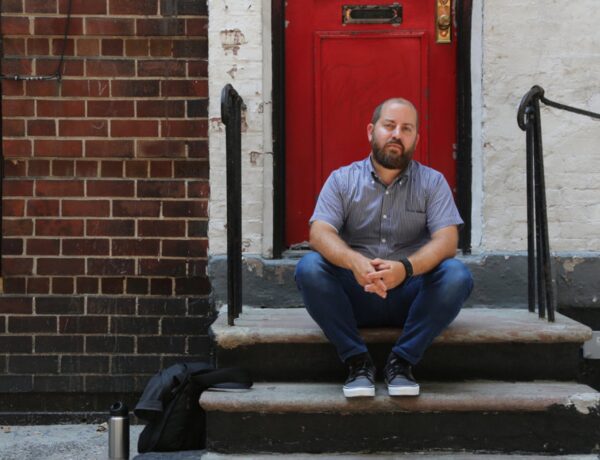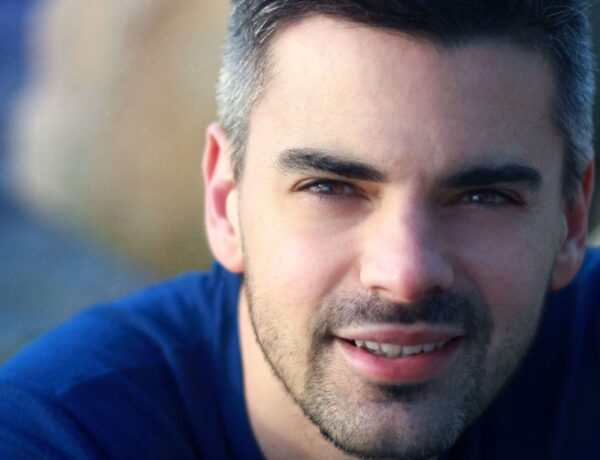Armando Lucas Correa is a Cuban-born writer, journalist, and editor based in New York. He started his career in print journalism in Cuba in 1988 as the editor of Tablas, a national theater and dance magazine in Havana.
In 1991, he moved to Miami to work for El Nuevo Herald, The Miami Herald Spanish edition newspaper, and in 1997, he settled in New York City as a senior writer for People en Español magazine.
Correa is the author of several books, including his first novel, The German Girl, which became an international bestseller translated into sixteen languages and published in over thirty countries. His second novel, The Daughter’s Tale, was released in 2019, and his latest novel, The Night Travelers, was published in January 2023.
Correa’s writing has earned him numerous awards, including the Creative Writing Award of the Cintas Foundation Fellowship in 2022 for The Night Travelers, as well as recognition from the National Association of Hispanic Publications, the Society of Professional Journalists, AT&T’s The Humanity of Connection Award, and the Hispanic Public Relations Association of New York’s Journalist of the Year Award.
Each week, we publish a new daily writing routine from a famous author. Subscribe to our newsletter so you don’t miss out!
Hi Armando, welcome to Famous Writing Routines, great to have you here with us today! Can you tell us about the inspiration behind your new novel, The Night Travelers?
While I was working on research for my novel The German Girl (it took me over a decade), I came across an article about a black German boy who survived the Nuremberg racial laws instituted by Hitler in 1933. That was the inspiration, you might say. From there I wanted to know more about the fate of the 60,000+ black Germans.
The Night Travelers spans across multiple generations of women and several decades of history. How did you approach researching and writing about these historical events and their impact on the lives of your characters?
The premise of the story, at first, was very simple: a young German poet has a “mischling” (mixed race) daughter with a black German musician. When the girl is about to turn seven, the mother has to do everything she can to get her out of the country. If she stays, she has to undergo X-rays to sterilize her, according to the Nuremberg racial laws. From there, the story became more complex as I wrote it. The novel began in the early 1930s in Berlin, went through Düsseldorf, from there to Havana, on to New York, back to Berlin, to Havana and closes in 2015 in the streets of Mitte in Berlin.
Ally, Lilith, Nadine, and Luna all have distinct experiences, but they are also united by a common thread of motherly love. Can you talk about the role of mothers and motherhood in the book?
I grew up in a matriarchy. My mother divorced my father when I was two and a half years old. We moved from Guantanamo to Havana and she enrolled in university where she became a mechanical engineer. I grew up under the tutelage of my mother, my grandmother, my sister and my cousins. All strong, intelligent women. I think you can feel that in my novels.
The Night Travelers is a sweeping novel that covers a lot of ground, both geographically and historically. How did you balance the different elements of the story to create a cohesive narrative?
When I’m writing I try not to feel constrained by structure or form. The most important thing as I begin to develop the plot is the voice. That voice guides you, the rhythm is also very important. I know there are many parallel stories, but my characters are born, they grow, they develop, they die. After the first manuscript, the game begins. You have to edit, eliminate everything that is left over, that makes the story dilute, that doesn’t flow. In my case, it is a work of months, if not years.
The reader is transported to several different locations, including Berlin, Havana, and East Berlin. How did you capture the unique essence of each of these places in your writing?
A New York Times reviewer, referring to The Daughter’s Tale, once said that my style was atmospheric. It was an excellent review, very favorable, but the concept of atmospheric scared me. Then I realized she was right. I have a journalistic background, but at the same time a theatrical one. That training can be felt in my books. I create scenes. For me, the space where the characters develop is important. I study very well the period where they live. I need to mentally walk the streets, enter those houses before writing. I build them in my mind. That’s how I work.
Do you struggle to stay focused while writing? You’re not alone! That’s why Famous Writing Routines recommends Freedom – the ultimate app and website blocker for Mac, Windows, Android, iOS, and Chrome. With over 2.5 million users, Freedom helps writers stay on task and avoid distractions. Get started for free today and reclaim your productivity!
As a Cuban writer and journalist, what role did your own background and experiences play in the creation of this novel?
I always say that you write as you read. I am a reader who writes. A reader who was trained as a journalist. The journalist is present in everything I write. Maybe that’s why the research process is so exhaustive, I almost take it on as an obsession.
Can you tell us about your writing routine? What does a typical day look like for you?
My writing routine changes depending on the book I am writing and the circumstances. We were living a few years threatened by a pandemic. Those years were completely different. I took refuge in a house, in the middle of the woods, with my children, for a year and a half. There I created my space. Now I tend to write more in the mornings, I aim to write at least 500 words a day. If there is one routine that I keep to, pandemic or not, whether I am in New York City or traveling, it is that before I write, I have to read for at least 45 minutes. It’s like a warm-up. Reading is how my brain activates.
If you could have a conversation with any author throughout history about their writing routine and creative process, who would that person be?
As a child, in Cuba, I read Madame Bovary, by Gustave Flaubert. Since then I knew it was a perfect novel. Reading about Flaubert, understanding him in the era in which he wrote, was a kind of obsession in my youth. Yes, it would definitely be with Flaubert the conversation.
I’d love to know about the books you’re reading at the moment. What have been some of your favorite recent reads?
I just finished reading Seven Empty Houses, by Samanta Schweblin, which just won the National Book Awards translation prize. My agent, Johanna Castillo now represents her and she was the one who recommended her to me. Very good book. The book I recently read and I think it is masterful, is Trust by Hernan Diaz. That brought me back to his first novel In the Distance which I liked even more.
2022 was the year I discovered Hanya Yanagihara. I had her first two books, which are each about a thousand pages long, but I didn’t dare. Until I read the author’s profile in The New Yorker about her new novel, To Paradise. I started with A Little Life and loved it. A heartbreaking book, a literary gem. Then I read The People in the Trees, her first novel and hated it. To Paradise is an excellent book, a bit of literary acrobatics a la Hernan Diaz in Trust, but a good book.
What does your current writing workspace look like?
I have a writing space in my home in Upstate New York. I have a huge white table. There I am surrounded by books. But I live in Manhattan, in the middle of the city. Anyone who knows New York City knows that space is in short supply. So in the dining room of my apartment, I have a corner, at the foot of the window, where I write every morning. There I am also surrounded by books and most importantly, in the mornings I can see the park from the window and there is plenty of sunshine.

Affiliate disclaimer: Some links on this website are affiliate links. We may earn a small commission if you make a purchase through these links, but only promote products we truly believe in. We disclose affiliate links and give honest reviews.



No Comments